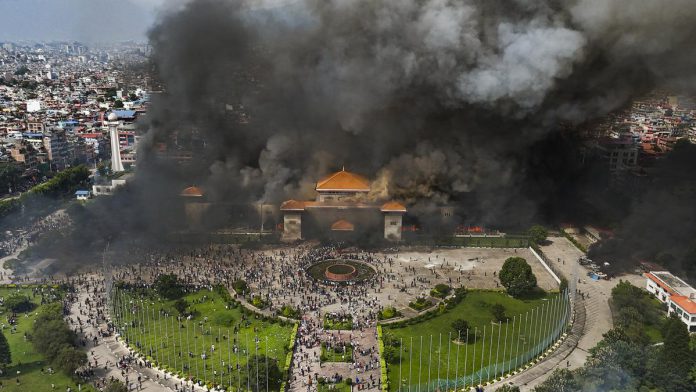Synopsis:
Revolt in Nepal: Gen-Z ignites a fierce upheaval after social-media blackout, shaking entrenched corruption and pushing democracy’s fragile foundations to the breaking point.
By Dr. Mohammad Farooque
Qalam Times News Network |Kolkata , September 10, 2025
Revolt ignites anew
Revolt isn’t too strong a word. When Nepal’s government banned social media on September 8, 2025, it didn’t just restrict platforms—it lit a fuse under Generation Z. Schoolchildren in uniform, phones in hand, anger in their eyes, and slogans on their lips—they scaled the walls of parliament. Within hours, that spark had engulfed the streets. It was fueled by years of oppression, corruption, and hopelessness—and it finally erupted.
Blood in the streets, power on the run
In just one day, 21 young people lost their lives; nearly 400 were injured. Police turned to live ammunition, tear gas, and rubber bullets. Curfews were swiftly imposed across Kathmandu and other cities. Interior Minister Ramesh Lekhak accepted moral responsibility and resigned—and the next day Prime Minister K.P. Sharma Oli followed suit. Though the social-media ban was lifted soon after, the public’s fury remains far from cooled. What’s clear is that this generation refuses to sit beside broken institutions—it’s demanding change.
A generation resisting false promises



This uprising is Gen-Z saying: we won’t be silent bystanders. They grew up hearing about monarchy’s abuses in textbooks—but they’re living the failure of democracy. Nepal’s per-capita income is just US $1,456—trailing Sri Lanka’s $3,342 and Bangladesh’s $2,688. Inflation hovers near 7.1 percent. Unemployment is widespread. Nepal ranks 107th out of 180 nations in Corruption Perceptions Index, and 84 percent of citizens cite corruption as their biggest grievance. Meanwhile, politicians’ children flaunt luxury cars and overseas vacations on social media. Hence slogans like “our tax, your extravagance” echo through the streets.
#NepoKid becomes a lightning rod
A generation’s anger found a symbol: #NepoKid. It exposes the contrast between citizens scraping for survival and the powerful living in opulence. That contrast fed the flame of revolt. The government said the social-media blackout was about curbing hate speech and fake news—but Gen-Z saw it as an attack on their identity, livelihoods, and civic awareness. Platforms like Facebook, Instagram, and YouTube aren’t just time-killers—they’re a way to connect, to earn, to organize. One chant defined the mood: “Ban corruption, not our social media.”
Echoes across the region
Nepal’s revolt isn’t happening in isolation. In 2022, Sri Lanka’s Aragalaya protest toppled the Rajapaksa dynasty. In 2024, students in Bangladesh forced Sheikh Hasina to step down. The common threads: rampant corruption, soaring costs, and unbearable frustration. With volatile forces at play in neighboring India, intensified military drills involving China, and rising activity from Pakistan and Bangladesh, the fallout could shift regional dynamics. Is this purely an internal storm—or part of a broader geopolitical game?
Democracy on the brink
Nepal’s history shows that power often falls in the streets: the 1990 Jana Andolan forced the king to concede. The 2006 Jana Andolan Nritya ended the monarchy, while a Maoist insurgency from 1996–2006 cost 17,000 lives. In 2025, another revolt has erupted. Democracy here has always been watered with blood’s memory. The urgent question: does this torrent mark dawn—or another cycle of crisis?
What’s next depends on how the nation responds. If the government engages with—and empowers—its youth, channels their energy into rebuilding institutions, a new Nepal might emerge. But if politicians simply squabble over seats while youth frustration is co-opted or crushed, history will grind on into a darker chapter. The revolt sweeping through Nepal now isn’t just a protest—it’s a turning point. And it belongs to the hands holding phones and dreaming of change.







